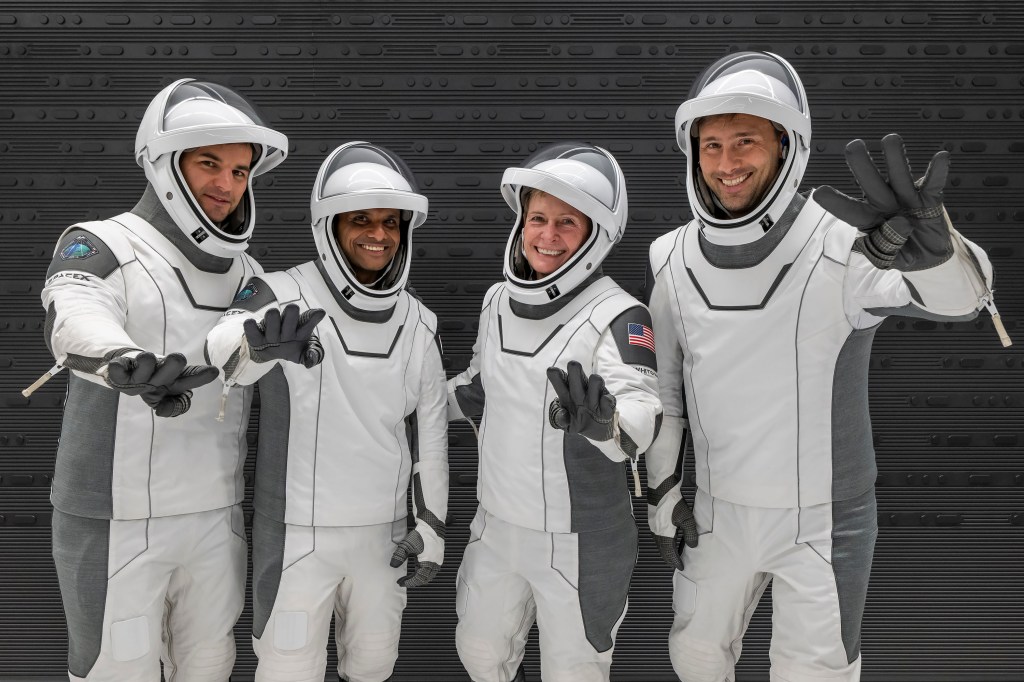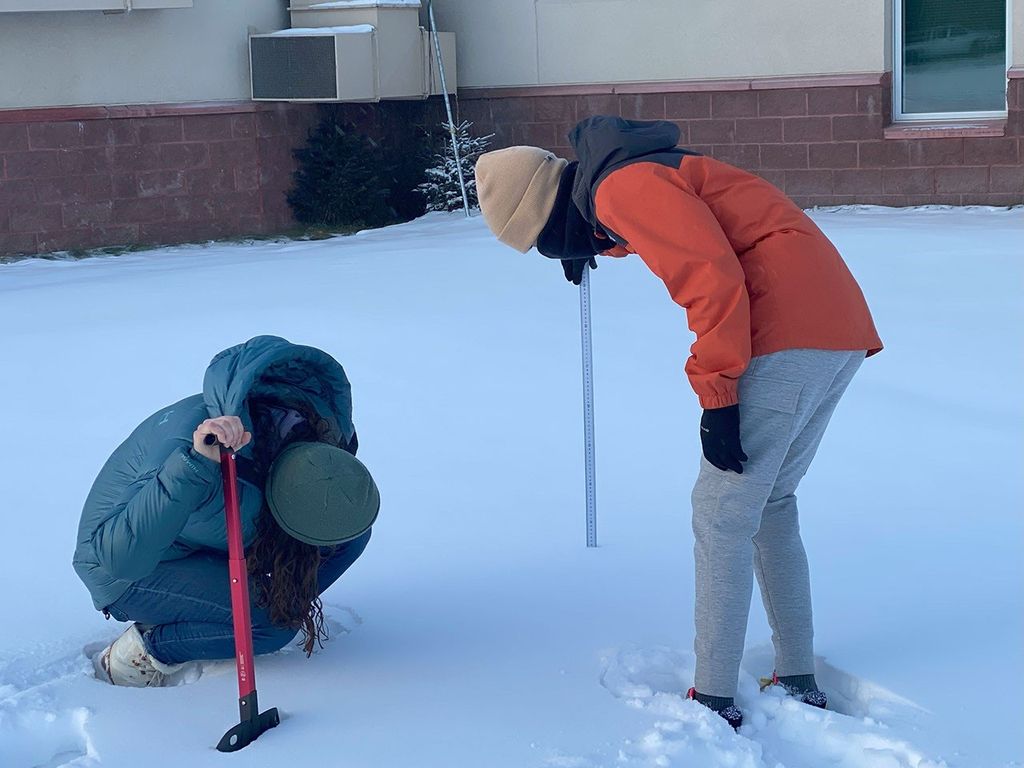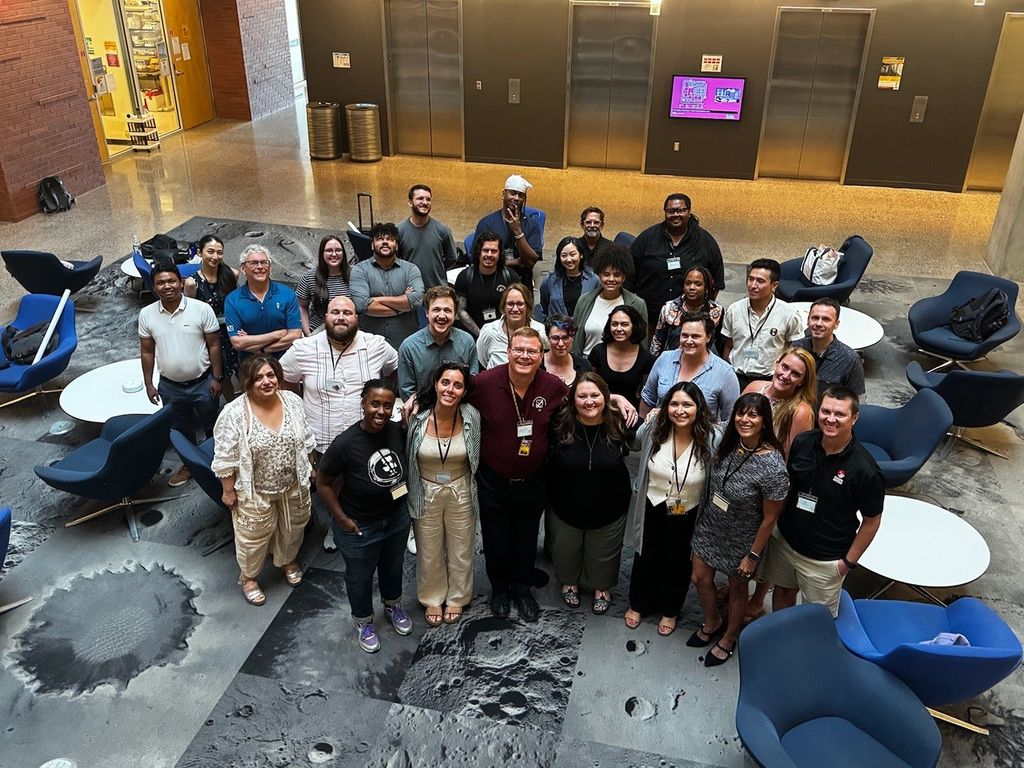
A conversation with Leticha Hawkins, a recruiter at NASA’s Ames Research Center in Silicon Valley. For the latest job openings and internship information at NASA Ames, including a link to active Ames government jobs and internships posted to USAJobs, the general internships programs and contractor listings, visit: https://www.nasa.gov/centers/ames/jobs-internships/index.html
Transcript
Matthew C. Buffington (Host):You are listening to NASA in Silicon Valley, episode 42. This is a special episode that I have been wanting to do for a long time. Our guest is Leticha Hawkins, a recruiter here at NASA Ames. A question that always pops up at NASA events and on social media is “How do I get a job at NASA?” Today we are going into detail on how to navigate the online process and land your dream job. This is particularly relevant to any students out there listening. In fact, there are currently several new Pathways internship positions available at NASA Ames. Follow the link on this transcript page, or go to USAJobs.gov and do some searches for Pathways and NASA Ames. So, here is Leticha Hawkins.
[Music]
Host): How did you end up at NASA, how’d you end up in Silicon Valley, how’d you end up getting a job over here?
Leticha: Well, I did the student route. So, I’m originally from the East Coast, Philadelphia, and after school and after undergrad and getting my master’s degree, I applied for the Presidential Management Internship program.
Host:That’s right. Now it’s called?
Leticha:The Presidential Management Fellows program, so that dates me. So, I applied while I was at the University of Delaware and got accepted, and I started working at NASA Headquarters in Washington D.C. And I was there for about six years, and then a job opened here at NASA Ames, and I applied, was accepted, so here I am now in Silicon Valley.
Host:And so I know for the PMF – it was formerly the PMI – there’s a whole, like, you do an interview, you put in an application. Did you always have in mind that you wanted to go to NASA, or was it open, or did that show up on your list of options?
Leticha:No. I did my undergraduate work at Spelman College, which is a historically black college for women in Atlanta, Georgia. And I was a sociology major. I knew I was going to be doing some type of community-based work. And at the time, though, when I was looking for work, the government had a furlough, and so NASA was one of the agencies that were hiring, and they were interested in me because, you’re right, the Presidential Management Fellows program is a very rigorous selection process.
Host:Especially on the East Coast.
Leticha:Yes. So after you pass the review of your written application, there are regional interviews where you have to do panel tests, you have situations with other applicants. And if you make that cut, they have what’s called a career fair where agencies approach you, you approach agencies, and NASA was interested in me.
Host:I did some grad school, I did my grad school in Washington, D.C. and everybody was clamoring for the PMF, it was crazy competitive, whereas other friends who went to Ohio or other places, not as many people necessarily knew about it. But I think back in the day, there were restrictions, like every school could get so many. I don’t know if that’s still a thing?
Leticha:I don’t know if it’s still a thing on the school level, but at the agency level, an agency has to be willing to support that type of position. But it is competitive. It’s no joke.
Host:This is one of – being in HR and working on recruitment stuff, this has been one of the episodes I’ve always wanted to do, because whether you’re looking at forum boards or posts on Reddit or social media things, apart from talking about space and the cool stuff NASA’s doing, we always get the questions of, how do I join NASA, how do I get in? So, we talked about the PMF and PMI, but for anybody who’s in school coming out of the gate, what are their options if they know they want to work with NASA, but how do they get in, or what are their options?
Leticha:First of all, every time I go out to career fairs, I am always so humbled and amazed at how many people, young and old, want to be part of NASA. And so, it’s good to know that there’s an interest in the space agency, and I’m always happy to tell them there is a place for almost every background at NASA. Of course people think of first astronauts, then they think of scientists and engineers, but they rarely think of the administrative positions we have. NASA hires almost as many administrative personnel, or non-STEM, as we do those science, technology, engineering and math positions. And so I tell them, if you’re an undergraduate, I ask, “Do you know about the Pathways program?” And sometimes they’ll say yes. When they say no, I say that’s the way the federal government, all federal government, hires its interns and recent graduates.
So, the first thing I would tell students is, learn about the Pathways program. And of course, NASA has its own Pathways positions we post. But in order to apply, you have to go through USAJobs, which is our online portal for receiving applications. And so I tell them, whatever you do today, your first assignment is to go back to your dorm or wherever you live, and you create an account on USAJobs, because you can’t do anything without that. And then you can take your time, upload your resume, and I always give them tips on how to create their account, how to create a resume. And that resume can be updated throughout their entire career, no matter where they go. As long as there’s a USAJobs, their resume will be there for them.
Host:And it’s interesting because in the past, oftentimes people will ask somebody else who’s already at NASA, how did you get onboard? In the past, there was different co-ops and internships and all these various ways, and the government basically consolidated all of those programs, for the most part, into Pathways. So, it’s a consistent, similar path for any federal agency.
Leticha:That’s correct. They’ll have the Pathways Internship Program, the Pathways Recent Graduate Program, which is for anyone – once you graduate from college, you have two years to be eligible for those recent graduate positions. And of course the third leg of it is the Presidential Management Fellows program.
Host:Excellent. And if I even stepped back a little earlier than that, for people looking for internships, that is you can be an intern through the Pathways program, but isn’t there also something else, the one-stop shop thing?
Leticha:Yes. The OSSI, One-Stop Shopping Initiative, and that is intern.nasa.gov. And those are positions that are not related to the Pathways positions, but they’re still opportunities for U.S. citizens to go and look for work that a NASA researcher or scientist or engineer – they’ll have eight to ten weeks of work where they want someone to help support that work. And you go through intern.nasa.gov to search positions and to apply.
And one thing I would let the students know is that it is competitive, that’s competitive as well, but make sure they go and they’re aware of the various deadlines, because unlike Pathways, positions come up all the time throughout the year. But there are specific open and close periods for One-Stop Shopping Initiative.
Host:And the big difference is that One-Stop Shopping Initiative where they do the internships, that is straight up, “Here’s an internship for X amount of weeks, it’s done, it’s over, you have a cool thing on your resume,” whereas Pathways, those internships are specifically geared toward, “Okay, after you’re done doing your internship, there’s a possibility of moving that into civil service employment.”
Leticha:Exactly. You mentioned before how there used to be other programs like co-ops, and we even sometimes called them STEP or SCEP positions. With the Pathways internship experience program, the goal is still to have a student come on and keep working for us as they progress through their school career, and at the end when they’re graduating, to be converted into a full-time employee at NASA. So, it is an opportunity for students to figure out, “Do I really want to be doing this?” and for the hiring official to say, “Is this person a good fit?”
Host:So, apart from that, I know some people at NASA who are in postdocs, or there’s different contractors and various things. Is the postdoctorate programs, is that considered like an internship, or is that through the Pathways? How exactly does that work, or is that completely separate?
Leticha:That’s completely separate, and just like intern.nasa.gov, if you get one of those positions, that’s totally separate. It’s not a government position, it’s almost like a contract. And so, Pathways is the civil servant position. You have to be a citizen in order to apply for those positions. We now, when NASA Ames goes to career fairs, we do take a list of our industry partners, the contractors that support our work. So, because our goal is, we understand that we’re not always hiring, but there are people who support our work who may be hiring, don’t have the same citizenship requirements, and so we give them that list and advise them to go on the company websites to see, do they have summer work? Do they have internships? Maybe they even have positions for students fresh out of college.
So, if you go to nasa.gov and click on “Ames,” you’ll see a lot of information. Because you’re right, there are several ways to get your foot in the door to work for NASA or at least to support NASA work, but your employer is one of the contractors.
Host:And at the top of the podcast where we have the little description, I’ll go ahead and put in the links for the one-stop shopping, give them a link to the contractor page, a link to USAJobs, so everybody can see those. If you’re listening to this, you can go back, click on some of those links, and you can go and check out some of the stuff we’re talking about.
Leticha:I’ll be happy to provide those to you.
Host:Excellent. So, if we’re circling back to USAJobs, some of the advice I give people, when you get into USAJobs, setup your account, get that going, but then go the next step, especially if you’re into Pathways. They have search criteria. So, you can setup alerts and search parameters. Even if you just put in “Pathways,” setup an alert so every single time a NASA job that has “Pathways” in it pops up in the system, you get an email. Because you don’t want to – even if you make your account – but stuff shows up, you just happen to be looking at the page that day – you get these email alerts.
Leticha:You are so right, and I do give that advice at career fairs and any other place I’m speaking about jobs and NASA. We’re busy, but you don’t want to miss an opportunity. So I tell them, you want to setup the alert so you can get an email notification, and it’ll say the job that you’re interested in, here’s a position that’s open, and then you can go check it out. And that’s another reason why I tell people, “Please put up your resume.” Don’t wait. Because a lot of times, by the time you find a position, the deadline for submitting your application may be really close, and you don’t want to be up all night starting from scratch.
So I tell these students, get your resume written, and I give them – not only do I give them a pamphlet on how to create your USAJobs account and tips for creating a NASA resume, but USAJobs has a pamphlet that is transferrable. Even if you’re doing a paper resume, the same tips will apply on how to make sure that you are presenting yourself to the best of your ability.
Host:And even going beyond some of the Pathway stuff of normal jobs, if you’re already in the federal government, or even if you’re on the outside trying to get into the federal government and applying for jobs, understanding how USAJobs works is crucial, because too often people will have their one-page, very succinct and pithy resume that works really great for maybe a private sector job, but when you go into USAJobs, you have the choice, you can either upload your resume, a PDF or doc, into the system so you have it in your account, or you can use their resume builder. Maybe I’m wrong, but I always push people to use the resume builder.
Leticha:Use the resume builder, and you can take as much space as you need and really take the time, because of the way the system works. And so, you want to pull out the verbiage, the words, that clearly match what the position is looking for. You want to use the right words, you want to use the right phrases so that that automated system can pick up on the fact that, yes, you are highly qualified for that position, and you should be moved to the next level of review.
Host:And so, even looking at uploading your resume versus using that resume builder, the cool thing about the resume builder is, it has certain required fields. Even something as simple as, you would think of working 40 hours a week in the job you listed there. It seems like, most people probably don’t put in their private sector or personal resume that it was a 40 hour a week job, but over in the USAJobs system, it forces you to do that. But that’s important, because when people start looking through it, it’s one of those questions that come up. Maybe in your own personal resume you didn’t think to add it, but that’s the good thing about using the USAJobs one, it kind of forces those questions that are going to come up.
Leticha:And that’s because it’s geared toward qualifications in the federal government. We deal a lot with time in service, and so we want to make sure that you have the experience at the grade level for the required amount of time that makes sure that you really have that experience. And so, that’s great, you’re right, that the resume builder, and even questions of veteran’s preference and citizenship – it makes you answer those questions, because if you’re a veteran, you’ll get extra points if it applies to the position. So yeah, that’s important.
Host:And also, building on that, for the folks who are already in the federal government, and I know from experience of having started off in a different federal agency and having moved to NASA, one thing that’s important is having the other supporting documents already uploaded and into the system. So, every federal employee, if you’re listening to this, you have what’s called an SF-50. And I always say, have your latest SF-50 uploaded into that system, because the last thing you want is on a deadline to put in your application and you can’t find it, or you’re having to dig through old emails. But also for vets as well, there’s different documentation…
Leticha:The DD-214, which will verify what you’re claiming as your preference. There’s also transcripts, college transcripts. So, really look at what’s required at the time of application, and then also have on deck any other supporting documentation that might come if you get to a certain level in the evaluation process.
Host:So, the basic pro tips – have a USAJobs account, setup your alerts, make for sure that you have – follow the resume builder. If you’re a vet, have that document already in your system. If you’re a federal employee, have your SF-50 already, because it’ll make it smoother, so when you see your dream job pop up, you can just jump on top of it.
Leticha:Got to be ready for the opportunity.
Host:And so going into – you touched on it before – about looking at words and phrases. Just telling about yourself, I always say it’s great, your resumes awesome and look at the cool stuff you did, but if it’s not relevant to the job that is posted, if it doesn’t match well with what your duties and the specialized skills, it’s like, it’s great to know what you did in the past, but anybody who’s a hiring official wants to know, “What are you going to do for me in the sense of, how does that match up with the duties I’m saying I’m looking for?”
Leticha:Right. So, with federal government work and qualifications, we want to know that you were doing or are doing relevant work to the position at the proper level. So, were you entry level, were you considered at an expert level, were you at a journeyman level? A lot of times I tell people – especially veterans, because they’re transferring the work they did in the military into now this federal resume, this federal world.
So, the one thing I say is, “We number one want to know what you’re doing, of course, but number two, what your impact was in the work you’re doing.” Because a lot of times somebody will write down, I worked on a team that built a robot. And so, that’s great, good for you! But what was your role on the team? Did you handle the scheduling, did you handle the budgeting, were you the team leader? All that stuff is really important to put you to the forefront. You have to say, this is what I did, how it impacted this group, this team, this project, and further, these are some successes, some rewards, or some other outcomes that were directly related to my work in this area.
Host:And this goes into building that – you have a section on that resume builder where you can talk about that job. And I always have that paragraph that describes what your job was, then it had little bullets where it goes through those good examples of, “Here’s the situation, here’s what I did, and here’s the impact on the organization.” That’s a perfect thing for the hiring person to see not just what you did, but how did it make a difference?
Leticha:Yes, and that is a way to evaluate a person’s knowledges, skills and abilities.
Host:Talk a little bit about how when you see a job up on USAJobs and it’s got the duties, or it has a quick job description, it has the duties, and then it goes into specialized skills or requirements, because that’s one of those important key things for people to make sure they go through and read that portion.
Leticha:Yes. So, you will have a summary of the general duties of a position. Sometimes, positions will have a specialized experience requirement that if you don’t have that, it possibly will disqualify you from eligibility. So, please pay attention to that and show, address how you have that specialized experience.
Host:It’s normally toward the bottom, and then you’ll see the thing where it’s like, at least a year equivalent of GS-13 or GS-12 work, that’s kind of a requirement. And then, sometimes it’ll even get a little bit more into the weeds of doing a very specific kind of work. And it’s important that people look at that, because the worst-case scenario is somebody who’s super-qualified, but if you don’t tell them in that resume builder that you did it, they’re never going to know, and you don’t get through in the system.
Leticha:Right. And those may also be called “selective placement factors.” You have your duties, the specialized experience, the selective placement factors. So, you have to look at all of that, and when you’re looking at your resume, make sure that you can point to experience that you see repeated in the vacancy announcements. So, if you can even make sure that the language closely matches how it was described in the vacancy announcement, the better.
Host:And this may seem like very much in the weeds, bureaucratic mumbo-jumbo, but this is important not only for people doing mission support – so, whether it’s like we’re doing, buying things, or making sure people get paid on time, or communications, or IT support – but this is very relevant for engineers and scientists and anybody who wants to work in the federal government or NASA as a whole. You have to go through this system in order to get a civil servant job.
Leticha:You do have to go through this system.
Host:I know it’s also a big interest among NASA, thinking of traditionally STEM jobs, it has historically been straight white male from the northeast getting into these positions. And I know it’s also important to have not only diversity of culture, diversity of thought. And so, could you talk a little bit about how NASA’s working to try to make STEM and NASA as a whole be more representative of the country that it represents.
Leticha:Yes, NASA and NASA Ames Research Center is very committed to recruiting a diverse workforce. And some of the things we’re doing to prove that is when we go out on our recruitment trips, we go to national conventions where the populations represent women, represent people of various ethnic groups. We go to historically black colleges and universities. We go to LGBT events as well. So, while we are looking for a highly-qualified candidate, we know that person can be found in several different venues.
And we even have taken it a step further, where we’re going into the local colleges and universities and we’re holding sessions so that we can build relationships with those different groups, and we’ll have a training on veteran status. We’re having training on resume building. So, different things like that, so that we can not only connect with those communities to let them know that yes, we are interested in you and we’re looking for you, but also to give them some good information to help them search and apply for jobs.
Host:What are some of the – are there any other tips, things that you tell people going through it?
Leticha:Well, one thing especially that I tell students, because a lot of them who are graduating want to just get their foot in the door someplace. There are others who are trying to, really they’re diligent about crafting their work experience to make sure that when they graduate, an employer can see they’ve had a passion in a particular area and they’ve taken deliberate, purposeful steps towards what they feel like is their career goal. So, I tell them as a student, you are in a prime position for people to be open to talking to you. I know when I was a student, you know, you’re young, you’re fresh-faced, and if you go to someone in a high position and you’re like, “Can you please just tell me what it’s like to be you?!” people love it. They’re like, “I want to talk to a student,” versus if you’re already in the job and somebody sees you – “Why are you bothering me? You have a job to do, don’t talk to me.”
So, students are in a perfect position to get advice from people in the field, to get to lean on their professors, because the professors a lot of times still have networks and working relationships with people in the field. And so, they shouldn’t only see that professor as the person that grades their work and puts them to sleep for an hour and a half in lecture. They should talk to them, really get – when professors know their students and know what their dreams are, they want to help a lot of times – most times. So, I tell students, “Use your position as a student, because you have entre to a lot of places and people that others don’t.”
Host:I always think, people think of interviews as an interview with the press, or an interview for a job, and I’m like, there’s these informal informational interviews. Especially as a student, you’re in that position where I just want to know what you’re doing, and most of the time, people are willing to talk about themselves.
Leticha:They sure are, and especially talking to someone who they feel like is looking up to them, and who can teach them something, because people like to feel good about themselves, and at the end of the day to say, you know, “I talked to some young people who wanted to know what it was like to be me.” And sometimes, a person can only give you a few minutes, but 15 minutes with a high-level executive can be gold. So, just never second-guess yourself when you’re wondering if you should approach someone. Never be afraid, and just be diligent. Be diligent, and don’t give up, because it’s true, sometimes people in certain positions are very busy, but that doesn’t mean that they don’t want to make time for you. And also, get to know their support staff too, because if you know the admins…
Host:That is the most important thing.
Leticha:They may take pity on you and say, he’s only, he or she only has 10 seconds, but you can have it.
Host:Exactly, or know when they’re going to go get their coffee break, or when they’re going to – or, they know every day, if you popped in now. And that’s always a very telling thing of how people are. If you just come in, if you’re dead-set focused of, “I’m going to talk to this CEO,” or “I’m going to talk to the division chief for this,” and if you’re not chitchatting with the person who’s running their schedule, you’re kind of shooting yourself in the foot.
Leticha:You’ll be spinning around in that little wheel for a long time. So yeah, and I also would say, we always do go for the high-level, but there are people who are working at all levels who have a story to tell and a lesson to teach. So also, don’t negate people who are in the line staff, because that’s probably where you’ll be starting, and so you’ll want – of course you know where you want to be, but think about the different steps along your journey, and talk to people along the way.
Host:That’s also, if you’re the ambitious go-getter, keep in mind by the time the person who’s in charge of things at that moment, by the time you’re working your way up in your career, they’ve already retired and left. You need to culture and develop those relationships amongst your peers and the people who are that level just above you, because these are the people you’re going to be working with throughout your career. And, it’s just good karma of, you treat people with respect and you’re interested – people feel that, and can tell.
Leticha:Absolutely, that’s so true. Be humble, be grateful, you’ll go far.
Host:Excellent. Thank you so much for coming on over. We’re going to put all the links up in the description for the podcast, for Pathways, for the Presidential Management Fellowship, for the contractor page, all that stuff. Anybody has questions for Leticha, we follow the #NASASiliconValley, of course we’re on Twitter @NASAAmes. Any questions come our way, we’ll loop you guys altogether.
Leticha:I look forward to getting those questions.
Host:Excellent. Thank you so much for coming on over.
Leticha:Thank you for having me.
[End]


























